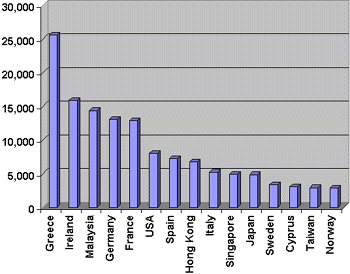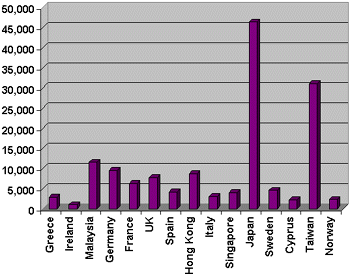Germany
The new Higher Education Framework Act that has changed the structure and final degrees of study programs also allows for the introduction of accreditation. Traditionally, German universities and Fachhochschulen (universities of applied sciences) offer programs that last between four to five years leading to a Diplom degree. The old system of education guaranteed a uniform quality of higher education throughout the country. As a result, there was little or no competition between institutions of higher education.
This is changing, however. Rising demand for higher education, the digital economy, the trend towards globalization and the rolling back of the welfare state in Europe have led to greater competition among universities and higher education systems within Germany.
Since the adoption of the new education law in August 1998, more and more universities have taken the opportunity to offer new degrees. There are currently 300 programs in Germany leading to a bachelor’s or master’s degree. However, concerns have been raised over whether or not the new system can maintain the high level of quality guaranteed by the German Diplom programs. Hence, the Framework Act provides for the introduction of accreditation.
To safeguard academic quality, an Accreditation Council was formed last July comprised of 14 higher education specialists. The objectives of the new accreditation scheme are to:
- Maintain minimal quality standards
- Promote student mobility
- Foster international recognition
- Ensure the transparency of programs and degrees
At the present time, the Accreditation Council monitors study programs only, and not institutions. In addition to dealing with study programs, the council recently established criteria for the accreditation of agencies. Hence the minimum requirements stipulate that accreditation agencies operate independently of universities, professional organizations and businesses.
— EAIE Forum
Spring 2000
Malta
With the country preparing for membership to the European Union (EU), significant reforms are being implemented in all sectors of the economy:
- Subsidies to shipbuilders are being phased out.
- Competition within the telecommunications industry is being introduced.
- Certain tariffs on EU imports must be lifted within three years.
Despite these changes, government stipends to university students (M60 pounds) will continue unabated. In addition, the Stipends Commission decided to guarantee this same amount for students studying abroad.A widespread concern is that Malta could suffer the kind of drain brain experienced by other countries that joined the EU (Spain and Portugal) as students leave for universities elsewhere.
Malta has always been proud of the fact that its premier institution of higher education, the University of Malta [1], is the oldest in the Commonwealth after Oxford and Cambridge. It has always encouraged students and faculty to go overseas for study. University officials are hoping that the lower cost of living, mild weather and the presence of external examiners from Britain will not only serve to keep locals from studying abroad, but will also encourage an influx of international students.
— Times Higher Education Supplement
April 7, 2000
The Netherlands
The HON Foundation, which serves as the parent organization for the Hogeschool Ijselland and the Hogeschool Enschede, has been renamed Saxion Ijselland — University of Professional Education [2]. The new name will allow the individual institutions to be called Saxion Hogeschool Ijsellend and Saxion Hogeschool Enschede, respectively.
The new name was developed in collaboration with Globobrands of Amsterdam and will emphasize the historical location of Saxony, which is part of the East Netherlands. This region and the adjoining German borderlands have been developing into a major industrial zone with tremendous growth potential. The Saxion Universities of Professional Education have forged strong ties with German partner institutions in Osnabruck, Munster and Hannover.
The two institutions are increasingly promoting themselves as one institution that will focus on meeting the needs of the business community and employment market. However, the recruitment of Dutch students will be carried out by each institution separately.
— Correspondence from Saxion Hogeschool IJsellend
Former Yugoslavia
In an effort aimed at putting an end to student protests against the regime of Slobadan Milosevic, the government ordered Serbian universities to end the spring semester early today (May 26, 2000). The Ministry of Education signed an order prohibiting campus demonstrations and ending classes a week early.
For several weeks now, students on campuses around the country have been protesting the government crackdown on critics, political opponents and the independent media. Students had organized an anti-Milosovic rally for today.
On Tuesday, several masked men attacked Belgrade University students who were holding a sit-in protest in a downtown building. Fifteen professors are protesting the attack and plan to cancel classes and exams.
— New York Times
May 26, 2000
United Kingdom
According to an international survey conducted by the British Council [3], higher education in the United Kingdom is in desperate need of a new brand image to attract more students from abroad. The report urges the government to undertake a marketing campaign aimed at dispelling the negative images that many international students have of Britain. The most common view is that the UK is “traditional and backward-looking … cold and wet, having harsh immigration laws, being worthy but dull.”
The government has set a target to recruit 50,000 more international students for higher education and 25,000 more for further education (technical/professional).
The British Council recommends that the rebranding focus on Britain’s strengths, which include tradition, diversity, safety, culture and lifestyle. Universities and colleges in the UK are known for offering good quality, relatively short programs leading to internationally recognized qualifications according to the report. At the same time, however, British higher education scores low on factors such as cost, admissions procedures, flexible courses and lack of scholarships. Ultimately, Britain’s failure to attract sufficient numbers of international students can be ascribed to the high cost of living in the UK and the difficulties of finding work after graduation.
In contrast, the report found that the United States is popular among international students because of that country’s preeminent position in popular culture, politics and high-tech, in addition to its image as the land of opportunity.
Australia, an increasingly aggressive player in overseas recruitment, is also honing in on Britain’s share of the market by promoting the country’s laid back image, which the report says comes from the Crocodile Dundee movies, beach life and Australian soap operas.
— Times Higher Education Supplement
Oct. 1, 1999
Of the top 25 nations providing international students to the United Kingdom in 1999, Greece came in first with more than 25,000 students. In comparison, Ireland (which was second on the list) only provided about 16,000 students. A few surprising entries on the list included Israel at number 25, Belgium at 22 and Finland 18.
Top 15 Countries Providing Students to the UK in 1999
Same 15 Countries Providing Students to the US in 1999
More surprising still, the Asian countries that provide huge numbers of students to the United States (Japan, Taiwan and China) do not even make it into the UK top 10. Are students from the Far East passing up the UK in favor of other English speaking countries for higher education? In the last five years, the number of Asians studying in both Australia and Canada has increased significantly, owing largely to aggressive marketing campaigns and increased promotional budgets in those countries.
— Studying Abroad, Open Doors


